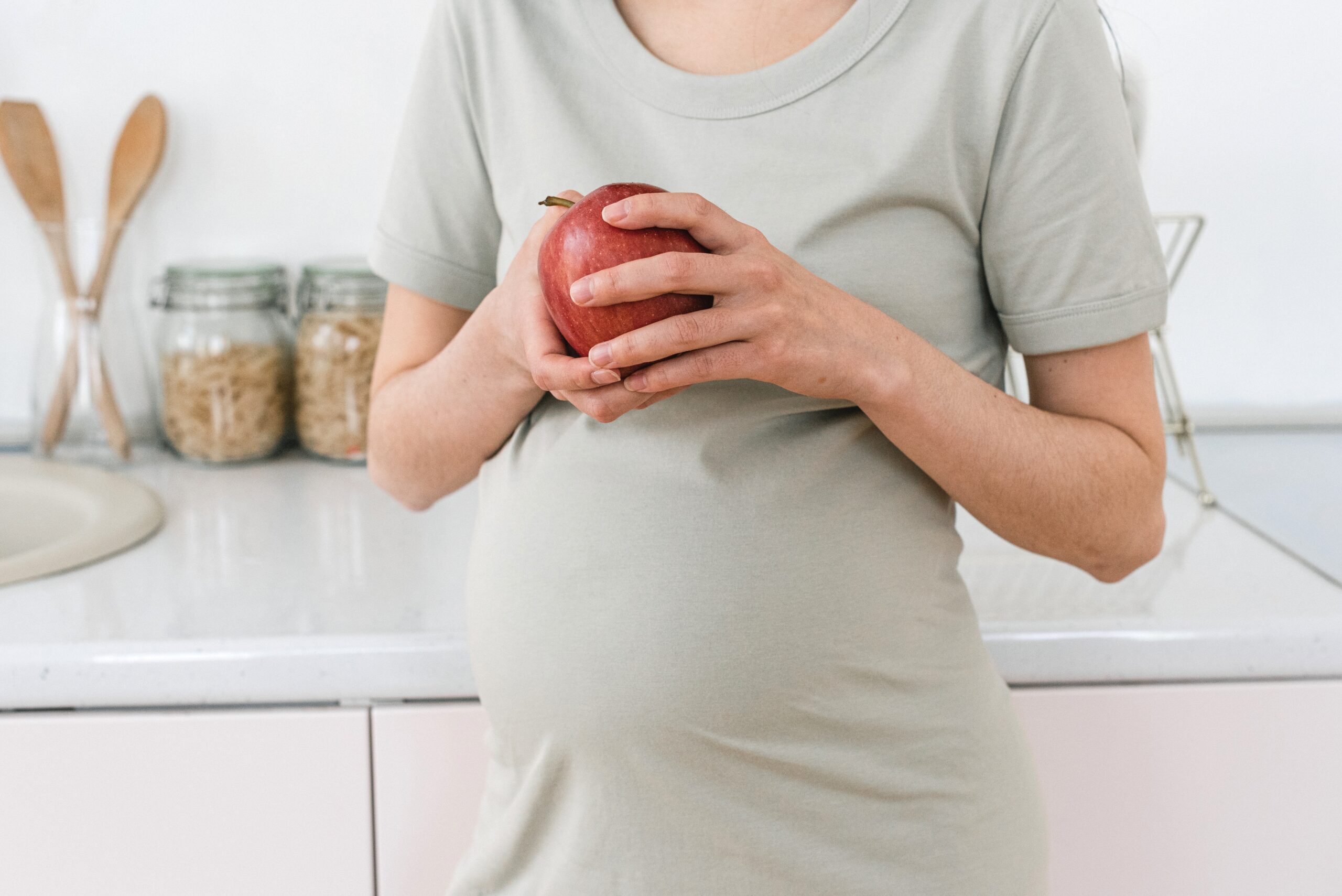Nutrition at Every Trimester
The general nutrition recommendation during each trimester is to have a well-balanced diet. Nutrition at every trimester includes a diet rich in folic acid, iron, calcium, vitamin D, choline, omega-3 fatty acids, B vitamins, and vitamin C. The following foods should be ingested during every trimester of pregnancy, but certain nutrients play an essential role in each trimester.
First Trimester
During the first trimester, it’s important to take a prenatal vitamin every day. It’s also important to hydrate sufficiently. Mom’s hunger and fullness cues may be off due to nausea, so we recommend eating the same quantity and frequency that was normal pre-pregnancy.
- Folate is essential to have during the first trimester and before pregnancy. This micronutrient is responsible for preventing neural tube defects. Take a prenatal vitamin and eat foods rich in folate such as green leafy greens, fortified breakfast cereals, kidney beans, nuts, oranges, strawberries, and beets to get the recommended 600 mg per day.
- Choline is essential for fetal brain development, and placental function. Choline is often overlooked and not found in many prenatal vitamins. That said, it plays a crucial role in brain development. During pregnancy, it is recommended to get 450 mg/day. Food sources include chicken, beef, liver, eggs, and soy products. Seek out a prenatal vitamin that includes choline as well, since it can be difficult to get enough just from food.
>> Learn more: Best foods to eat during the first trimester
Second Trimester
During the second trimester, mom will likely have increased cues for hunger and should have an additional 340 calories per day. If mom is carrying twins, she will need even more calories per day.
- Iron is responsible for mom’s blood supply as the demands are elevated as the baby grows. It can be difficult to get the recommended amount of 27 mg per day from food alone. Moms should take prenatal vitamins to reduce the risk of pregnancy anemia. Good sources of iron include beef, liver, chicken, eggs, tofu, and spinach.
- DHA is important for the developing brain and eyes in utero. It also protects the brain from inflammation and damage. Good sources of DHA include eggs and low-mercury fish such as salmon, mackerel herring, and sardines.
Third Trimester
During the third trimester, iron and omega 3’s remain increased. Mom’s body will prioritize sending nutrients to the baby first, so it’s critical to be mindful of nutrition.
- Baby needs calcium the most during the third trimester. Calcium is crucial for babies developing teeth and bones. Mom needs to have a well-balanced diet which includes milk, cheese, yogurt, and dark leafy greens to get the recommended 1000 milligrams of calcium per day. Too little calcium in the diet can lead to osteoporosis later in life as well.
- Protein is responsible for muscle development for both mom and baby. Adequate protein intake during pregnancy also supports uterine tissue growth. Good sources of protein include eggs, chicken, and greek yogurt. It is recommended to have at least 80 grams of protein in the first half of pregnancy and a minimum of 100 grams of protein in the last half of pregnancy.
>> Learn more: Best foods to eat during pregnancy
Additional Tips for Nutrition at Every Trimester
- Vitamin C helps boost iron absorption and promote bone and tissue development in babies. Foods rich in Vitamin C include oranges, broccoli, and strawberries.
- Potassium and sodium work together to maintain proper fluid balance and regulate blood pressure. Aim to get 2900 milligrams per day through prenatal vitamins and in foods like bananas, apricots, and avocados.
- Zinc plays an essential role in the construction of a baby’s cells and DNA during pregnancy. Zinc promotes tissue growth and cell division to help support the normal development of the baby.
- Vitamin K2 is essential for proper bone mineralization. K2 ensures that calcium accumulates in the bone tissue, rather than soft tissue. K2 is found in fatty animal foods such as full-fat dairy, eggs, and liver. It can also be found in fermented foods such as sauerkraut and natto.
- Vitamin A helps regulate gene expression and fetal growth with specific roles in the development of the heart, eyes, ears, limbs, and immune system. The best form of the vitamin is found in full-fat dairy and eggs.
- Glycine supports a baby’s skeleton, teeth, internal organs, hair, skin, and nails. Glycine is necessary to support a mother’s stretching skin, growing uterus, and placenta. The best sources of glycine are found in red meat, seeds, turkey, pork, and chicken.
- Caffeine can be consumed, but stick to no more than 200 mg (under 16oz) per day. Caffeine can be found in coffee, tea, and chocolate.
>> Read More: How a Prenatal Nutritionist Can Help During Pregnancy
Postpartum Nutrition
When mom enters the postpartum period, we recommend she eat the same way as she did during pregnancy, but with few modifications. Breastfeeding moms can find themselves ravenous during the first few weeks. Did you know that breastfeeding moms can burn up to an additional 500 calories per day for the first 6 months of postpartum? Below are some recommendations to help the body recover from post-birth.
- Soups, stews, and curries made with bone broth. This will provide the mother with collagen-building amino acids, electrolytes, and many micronutrients.
- High-fat foods, like pork, butter/ghee, fatty fish, and nuts/seeds.
- High-iron foods, such as slow-cooked meat, and organ meats, such as liver, kidney, and heart.
- Foods that are rich in omega-3 fats, such as seafood, eggs, and grass-fed beef.
- Iodine-rich foods, such as seafood or seaweed-infused broths
- Veggies such as leafy greens, bell peppers, broccoli, avocados, carrots, kale, sweet potatoes, tomatoes, celery, cabbage, and carrots
- Well-cooked grains/starches, such as oatmeal, rice, or sweet potatoes
- Fruit like bananas, apples, berries, mangos, and citrus fruits.
- Choline is still very important postpartum, this nutrient is present in breast milk and plays a role in the baby’s nervous system and brain development. Lactating women need 550 milligrams a day to help replenish their stores and meet baby’s needs. Food sources include eggs, beef, liver, and soy products.
Nutrition at Every Trimester: Summary
It is important for the mother to stay as rested and relaxed as much as possible during pregnancy. She should consume foods that make her feel good inside and out. Her diet should be colorful and full of variety to help support her and her growing baby. Prenatal and Postpartum the mother’s diet should include high protein, healthy fats, carbohydrates, and a variety of fruits and vegetables.
Working with a prenatal nutritionist can help you make sure you’re eating healthy foods. They can also help with other issues such as if you feel like you’re gaining too much weight while pregnant despite not eating a lot or are dealing with food intolerances.
Written by Jacqueline Rodriguez, RDN, MS, CDN
Zaya Care is a network of maternity care specialists covered by insurance. Jacqueline has over six years of experience working in the Health and Fitness industry. She provides nutrition and fitness coaching to women, men, and children of all ages. As a Registered Dietitian, she specializes in Weight Loss, Pre/Postnatal, Prediabetes, and Early childhood nutrition. Click here to schedule a consultation, covered by insurance.

Healthy mom, healthy baby: Get support from a prenatal dietitian
90% of Zaya Care patients pay $0 for one-on-one counseling with a Registered Dietitan
The general nutrition recommendation during each trimester is to have a well-balanced diet. Nutrition at every trimester includes a diet rich in folic acid, iron, calcium, vitamin D, choline, omega-3 fatty acids, B vitamins, and vitamin C. The following foods should be ingested during every trimester of pregnancy, but certain nutrients play an essential role in each trimester.
First Trimester
During the first trimester, it’s important to take a prenatal vitamin every day. It’s also important to hydrate sufficiently. Mom’s hunger and fullness cues may be off due to nausea, so we recommend eating the same quantity and frequency that was normal pre-pregnancy.
- Folate is essential to have during the first trimester and before pregnancy. This micronutrient is responsible for preventing neural tube defects. Take a prenatal vitamin and eat foods rich in folate such as green leafy greens, fortified breakfast cereals, kidney beans, nuts, oranges, strawberries, and beets to get the recommended 600 mg per day.
- Choline is essential for fetal brain development, and placental function. Choline is often overlooked and not found in many prenatal vitamins. That said, it plays a crucial role in brain development. During pregnancy, it is recommended to get 450 mg/day. Food sources include chicken, beef, liver, eggs, and soy products. Seek out a prenatal vitamin that includes choline as well, since it can be difficult to get enough just from food.
>> Learn more: Best foods to eat during the first trimester
Second Trimester
During the second trimester, mom will likely have increased cues for hunger and should have an additional 340 calories per day. If mom is carrying twins, she will need even more calories per day.
- Iron is responsible for mom’s blood supply as the demands are elevated as the baby grows. It can be difficult to get the recommended amount of 27 mg per day from food alone. Moms should take prenatal vitamins to reduce the risk of pregnancy anemia. Good sources of iron include beef, liver, chicken, eggs, tofu, and spinach.
- DHA is important for the developing brain and eyes in utero. It also protects the brain from inflammation and damage. Good sources of DHA include eggs and low-mercury fish such as salmon, mackerel herring, and sardines.
Third Trimester
During the third trimester, iron and omega 3’s remain increased. Mom’s body will prioritize sending nutrients to the baby first, so it’s critical to be mindful of nutrition.
- Baby needs calcium the most during the third trimester. Calcium is crucial for babies developing teeth and bones. Mom needs to have a well-balanced diet which includes milk, cheese, yogurt, and dark leafy greens to get the recommended 1000 milligrams of calcium per day. Too little calcium in the diet can lead to osteoporosis later in life as well.
- Protein is responsible for muscle development for both mom and baby. Adequate protein intake during pregnancy also supports uterine tissue growth. Good sources of protein include eggs, chicken, and greek yogurt. It is recommended to have at least 80 grams of protein in the first half of pregnancy and a minimum of 100 grams of protein in the last half of pregnancy.
>> Learn more: Best foods to eat during pregnancy
Additional Tips for Nutrition at Every Trimester
- Vitamin C helps boost iron absorption and promote bone and tissue development in babies. Foods rich in Vitamin C include oranges, broccoli, and strawberries.
- Potassium and sodium work together to maintain proper fluid balance and regulate blood pressure. Aim to get 2900 milligrams per day through prenatal vitamins and in foods like bananas, apricots, and avocados.
- Zinc plays an essential role in the construction of a baby’s cells and DNA during pregnancy. Zinc promotes tissue growth and cell division to help support the normal development of the baby.
- Vitamin K2 is essential for proper bone mineralization. K2 ensures that calcium accumulates in the bone tissue, rather than soft tissue. K2 is found in fatty animal foods such as full-fat dairy, eggs, and liver. It can also be found in fermented foods such as sauerkraut and natto.
- Vitamin A helps regulate gene expression and fetal growth with specific roles in the development of the heart, eyes, ears, limbs, and immune system. The best form of the vitamin is found in full-fat dairy and eggs.
- Glycine supports a baby’s skeleton, teeth, internal organs, hair, skin, and nails. Glycine is necessary to support a mother’s stretching skin, growing uterus, and placenta. The best sources of glycine are found in red meat, seeds, turkey, pork, and chicken.
- Caffeine can be consumed, but stick to no more than 200 mg (under 16oz) per day. Caffeine can be found in coffee, tea, and chocolate.
>> Read More: How a Prenatal Nutritionist Can Help During Pregnancy
Postpartum Nutrition
When mom enters the postpartum period, we recommend she eat the same way as she did during pregnancy, but with few modifications. Breastfeeding moms can find themselves ravenous during the first few weeks. Did you know that breastfeeding moms can burn up to an additional 500 calories per day for the first 6 months of postpartum? Below are some recommendations to help the body recover from post-birth.
- Soups, stews, and curries made with bone broth. This will provide the mother with collagen-building amino acids, electrolytes, and many micronutrients.
- High-fat foods, like pork, butter/ghee, fatty fish, and nuts/seeds.
- High-iron foods, such as slow-cooked meat, and organ meats, such as liver, kidney, and heart.
- Foods that are rich in omega-3 fats, such as seafood, eggs, and grass-fed beef.
- Iodine-rich foods, such as seafood or seaweed-infused broths
- Veggies such as leafy greens, bell peppers, broccoli, avocados, carrots, kale, sweet potatoes, tomatoes, celery, cabbage, and carrots
- Well-cooked grains/starches, such as oatmeal, rice, or sweet potatoes
- Fruit like bananas, apples, berries, mangos, and citrus fruits.
- Choline is still very important postpartum, this nutrient is present in breast milk and plays a role in the baby’s nervous system and brain development. Lactating women need 550 milligrams a day to help replenish their stores and meet baby’s needs. Food sources include eggs, beef, liver, and soy products.
Nutrition at Every Trimester: Summary
It is important for the mother to stay as rested and relaxed as much as possible during pregnancy. She should consume foods that make her feel good inside and out. Her diet should be colorful and full of variety to help support her and her growing baby. Prenatal and Postpartum the mother’s diet should include high protein, healthy fats, carbohydrates, and a variety of fruits and vegetables.
Working with a prenatal nutritionist can help you make sure you’re eating healthy foods. They can also help with other issues such as if you feel like you’re gaining too much weight while pregnant despite not eating a lot or are dealing with food intolerances.
Written by Jacqueline Rodriguez, RDN, MS, CDN
Zaya Care is a network of maternity care specialists covered by insurance. Jacqueline has over six years of experience working in the Health and Fitness industry. She provides nutrition and fitness coaching to women, men, and children of all ages. As a Registered Dietitian, she specializes in Weight Loss, Pre/Postnatal, Prediabetes, and Early childhood nutrition. Click here to schedule a consultation, covered by insurance.

Healthy mom, healthy baby: Get support from a prenatal dietitian
90% of Zaya Care patients pay $0 for one-on-one counseling with a Registered Dietitan

















